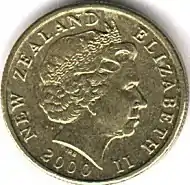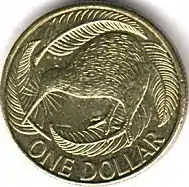New Zealand one-dollar coin
The New Zealand one-dollar coin ($1) is a coin of the New Zealand dollar. The current circulating coin was introduced on 11 February 1991 to replace the existing $1 note. There had previously been occasional issues of commemorative "silver dollars", but they are rarely seen in circulation.
New Zealand | |
| Value | 1.00 New Zealand dollars |
|---|---|
| Mass | 8.00 g |
| Diameter | 23.00 mm |
| Thickness | 2.74 mm |
| Edge | Intermittently milled |
| Composition | Copper-Aluminium-Nickel (Cu 92%, Al 6%, Ni 2%) |
| Years of minting | 1990–present |
| Catalog number | – |
| Obverse | |
 | |
| Design | Elizabeth II, Queen of New Zealand |
| Designer | Ian Rank-Broadley |
| Design date | 1999 |
| Reverse | |
 | |
| Design | A kiwi surrounded by silver fern fronds |
| Designer | Robert Maurice Conly |
| Design date | 1990 |
The depiction of a kiwi on the reverse helps give the New Zealand dollar the colloquial name "Kiwi (dollar)", although the term was in use before the $1 coin was introduced.
Both the $1 and $2 coins are gold-coloured, and requests for a Koha, donation or entry fee sometimes say gold coin please.
Current circulating coin (1991–present)
The current coin replaced the New Zealand one dollar note in use since New Zealand's currency was decimalised on 10 July 1967. The reason for replacing the note was due to inflation making the note more expensive to produce, and notes had to be replaced regularly due to wear and tear. The $1 coins, and $2 coins, were first minted in 1990 but circulated in 1991. The $1 notes were withdrawn later that year.
The new $1 coin was made of aluminium bronze, and was 23.0 mm in diameter, 2.74 mm thick, and 8.0 g in weight.[1] The edge of the coin consisted of eight sections, alternating between milling and plain sections. The reverse of the coin was designed by Robert Maurice Conly,[2] and depicted two symbols of New Zealand: a kiwi facing left in the centre, surrounded by four fronds of the silver fern (Cyathea dealbata). Both the kiwi and the silver ferns sat above the legend reading the denomination "ONE DOLLAR". The obverse consisted of Raphael Maklouf's portrait of Queen Elizabeth II, the Queen of New Zealand, with the legend reading "ELIZABETH II NEW ZEALAND [year of minting]".
In 1999, the obverse of all new $1 coins was changed with the addition of Ian Rank-Broadley's portrait of Queen Elizabeth II, and the legend was rearranged to read "NEW ZEALAND ELIZABETH II [year of minting]".
In 2006 the Reserve Bank of New Zealand replaced the 10c, 20c and 50c coins in circulation with smaller, lighter ones, and removed the 5c coin from circulation. The $1 remained the same as it was relatively new (the oldest $1 coins were only 14 years old), they circulated well, and the extra expense of adapting machines that only took $1 coins. Another reason for the change in size was that the 10c and $1 coin were very similar in size, being only 0.62 mm different in diameter.
Due to a similar design, it was sometimes possible to pass the $1 coin as a £1 coin in the United Kingdom, in shops and vending machines. However, since the new 2017 £1 coin release this is no longer possible.
Mintages
| Year | Coins minted[3] |
|---|---|
| 1990 | 40,000,000 |
| 1991 | 10,000,000 |
| 2000 | 5,000,000 |
| 2002 | 8,000,000 |
| 2003 | 4,000,000 |
| 2004 | 2,700,000 |
| 2005 | 2,000,000 |
| 2008 | 11,000,000 |
| 2010 | 10,000,000 |
| 2013 | 10,080,000 |
| 2015 | 10,000,000 |
| 2019 | 12,200,000 |
| Total | 125,740,000 |
Future
After the death of Queen Elizabeth II in September 2022, the Reserve Bank said it would exhaust its existing coin stocks before introducing new coins featuring King Charles III. Based on current stock levels, this would likely be several years away.[4]
See also
References
- "New Zealand coinage specification". Reserve Bank of New Zealand. Archived from the original on 9 July 2015. Retrieved 27 January 2009.
- "History of New Zealand coinage". Reserve Bank of New Zealand. Archived from the original on 23 January 2009. Retrieved 27 January 2009.
- "Mintings of New Zealand coins". Reserve Bank of New Zealand. Retrieved 24 October 2009.
- Edmunds, Susan (9 September 2022). "What happens now to New Zealand's coins and bank notes?". Stuff. Retrieved 12 September 2022.